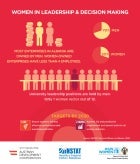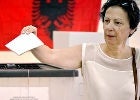Breadcrumb
Stories
Topic
- Show all (1287)
- Beijing Platform for Action (-) (11)
- Leadership and political participation (-) (9)
- Ending violence against women and girls (72)
- Gender equality and women’s empowerment (45)
- Anti-violence interventions (42)
- Gender discrimination (38)
- Gender equality and inequality (38)
- Domestic violence/interpersonal violence (36)
- Access to justice and legal protection (34)
- Legal assistance (30)
- Laws, legislation (27)
- Primary prevention (25)
- Gender-responsive budgeting (24)
- Sexual harassment (24)
- Feminicide/femicide (23)
- Service delivery (23)
- Economic empowerment (22)
- Rape/sexual assault (21)
- Shelters (21)
- Employment (20)
- Rural women (19)
- Entrepreneurship (18)
- Decision-making (16)
- Youth (16)
- Gender power relations (15)
- Women’s rights (15)
- COVID-19 (14)
- Financing for gender equality (13)
- Gender mainstreaming (13)
- Civil society (12)
- Gender, culture and society (12)
- Men and boys (masculinity) (12)
- Political empowerment (12)
- Access to basic services (11)
- Adolescents (11)
- Businesses and foundations (11)
- Girls (11)
- Human rights (11)
- UNiTE campaign (11)
- Civil society participation (10)
- Peace and security (10)
- Safe Cities and Safe Public Spaces (10)
- Training (10)
- Women with disabilities (10)
- Convention on the Elimination of All Forms of Discrimination against Women (CEDAW) (9)
- Financial resources (9)
- Gender stereotypes (9)
- Information and communications technology (ICT) (9)
- National planning (9)
- Partnerships (9)
- Governance (8)
- Innovation and technology (8)
- Institutional mechanisms (8)
- Peacebuilding (8)
- Social protection (8)
- Women farmers (8)
- Citizen engagement (7)
- Gender statistics (7)
- Generation Equality (7)
- Government contributors (7)
- Productive resources (7)
- Religion (7)
- Science and technology for development (7)
- Sports (7)
- Trafficking/sexual exploitation (7)
- Women’s movements (7)
- 2030 Agenda for Sustainable Development (6)
- Child marriage (6)
- Communications and media (6)
- Electoral systems and processes (6)
- Lesbian, gay, bisexual, transgender, intersex (LGBT) rights (6)
- Markets (6)
- Political violence (6)
- Sex-disaggregated data (6)
- Sustainable Development Goals (SDGs) (6)
- Traditional media (6)
- Unpaid work (6)
- Accountability (5)
- Gender data production and collection (5)
- Governance and national planning (5)
- New media (5)
- Rural development (5)
- Constitutions and legal reform (4)
- Gender data gaps (4)
- Gender data use and accessibility (4)
- Gender wage gap (4)
- Health (4)
- Intergovernmental processes (4)
- Land and property (4)
- Media leadership (4)
- Poverty (4)
- Public administration (4)
- Rule of law (4)
- Schooling (4)
- Accountability in the UN system (3)
- Climate change (3)
- Crisis response and recovery (3)
- Education (3)
- Environmental protection (3)
- Gender equality indicators (3)
- Health care services (3)
- Inheritance rights (3)
- Living conditions (3)
- National mechanisms (3)
- National statistical systems (3)
- Parliamentary development (3)
- UN Security Council resolution 1325 (3)
- UN system coordination (3)
- Capacity development (2)
- Coordination, knowledge management (2)
- Disaster risk reduction (2)
- Food security (2)
- Fundamental freedoms (2)
- Fund for Gender Equality (2)
- Harmful practices (2)
- Humanitarian action (2)
- Human rights–based approach (2)
- Macroeconomic policies (2)
- Monitoring and evaluation (2)
- Planning and monitoring (2)
- Sexual and reproductive health and rights (2)
- UN Security Council resolutions (2)
- Urban development (2)
- Åsa Regnér, Deputy Executive Director for Policy, Programme, Civil Society and Intergovernmental Support (1)
- Children’s rights (1)
- Commission on the Status of Women (1)
- Executive Director (1)
- Financial and economic crisis (1)
- Green economy (1)
- Literacy (1)
- Local development (1)
- Maternal health (1)
- Migration (1)
- Monitoring, evaluation and reporting (1)
- Peace processes (1)
- Public sector reform (1)
- Sexuality (1)
- Temporary special measures, affirmative action (1)
- UN Trust Fund to End Violence against Women (1)
Region
Country
1 - 20 of 20 Results
Date:
With nearly 30 years of reporting on crime, justice, and social issues, journalist Anila Hoxha is a leading voice for women silenced by violence in Albania. As a long-time member of the UN Women Media Forum, she sheds light on femicide, economic injustice, and gender inequality through her investigations, podcasts, and advocacy.
Date:
As Albania celebrates three decades since the adoption of the Beijing Declaration, the country continues to make strides in gender equality. An inspiring intergenerational dialogue at a recent event brought together key stakeholders from the Ministry of Health and Social Protection, United Nations Albania, the EU Delegation, and other partners, alongside passionate feminist activists from all generations.
Date:
Interview with Flutura Xhabija on attending the Fourth World Conference on Women in Beijing in 1995 and how the Beijing Platform for Action remains relevant today.
Date:
In a groundbreaking event, delegates from Europe and Central Asia committed to accelerating progress on gender equality and making the lives of women and girls across this region better. The international conference “Charting the Future 30 Years after Beijing: Effective Institutional Mechanisms for the Advancement of Gender Equality and Women's Empowerment” brought together over 80 officials from across Europe, Central Asia, and beyond.
Date:
Over the past decades, women and girls around the world have demolished barriers, dismantled stereotypes and driven progress towards more just and equal societies. Women’s rights were recognised as fundamental and universal human rights.
Date:
The local government elections on 14 May are an important opportunity to strengthen local democracy in Albania, and to consolidate past achievements in promoting women leadership in decision-making. Ahead of the start of the campaign, the United Nations in Albania reached out to political party leaders, advocating for women’s full and meaningful participation in local elections, and presenting a set of recommendations in three key areas.
Date:
Around 20 journalists and media experts joined the media forum on "Media and Violence Against Women in Politics and Elections" organized prior to Albania’s Local Elections taking place on the 14th of May, by UN Women and its partner organization "Together for Life". Participants in the event discussed the various challenges faced by women in politics and elections and the crucial role of the media in addressing them.
Date:
A joint position paper by United Nations in Albania identifying four key areas and strategies to accelerate gender equality and the empowerment of all women and girls in the country.
Date:
Building back better from COVID-19 needs investment in feminist, grass-roots leadership. Yet, direct funding to women’s organizations accounts for less than one per cent of the global official development assistance provided for gender equality. In six stories, learn about the critical support that grass-roots women leaders and their organizations bring to their communities.
Date:
UN Women is intensifying its preparations for the 2021 Generation Equality Forum amidst a back-drop that shows women’s rights and leadership are under threat, and even more exacerbated due to the COVID-19 pandemic. Current projections show that gender equality in the highest positions of power will not be reached for another 130 years. This year’s International Women’s Day rings the alarm on rising threats to gender equality and highlights the need to build back better for a more gender-equal future.
Date:
In this new intergenerational series for Generation Equality campaign, young people take the lead to shape the conversations. Xheni Karaj, a 34-year-old LGBTI activist from Albania is talking with Delina Fico, who was part of the Albanian delegation in the Fourth World Conference on Women, in Beijing.
Date:
25 years after the adoption of the Beijing Declaration and Platform for Action, as much has been achieved, we are still far from realizing the promise made in Beijing. No country in the world has achieved gender equality, we see painfully slow progress or even worse, pushback.
Date:
On 9 September 2020, feminists and women’s rights advocates from the Western Balkans and Turkey region will gather virtually to discuss an urgent pathway to deliver on the commitments made in the Beijing Declaration and Platform for Action.
Date:
Urges for delivery on the commitments made in the Beijing Platform for Action
Date:
Ms. Eglantina Gjermeni, chairwoman of Parliamentary Sub-Committee on Gender Equality in Albania, was a key speaker at the “Smart investments: Financing for gender equality” side event, held during the 25th year anniversary of the Beijing+25 Regional Review Meeting for the UN Economic Commission for Europe (UNECE) Region.
Date:
Billions of people across the world stand on the right side of history every day. They speak up, take a stand, mobilize, and take big and small actions to advance women’s rights. This is Generation Equality. Fatmira Dajlani has been working as an activist for 14 years in Albania and is leading “Roma Gateway for Integration” organization in Fushe Kruje.
Date:
Albanian actress Ema Andrea, 48, is co-founder of Albanian Women in the Audio-visual Association, which promotes gender equality for professional women active in the cinematography and multimedia sectors. A women’s rights advocate, Ms. Andrea is a professor at the Academy of Arts in Tirana. She speaks to UN Women about gender equality in Albania and the portrayal of women in media, which is related to the Beijing+25’s Women and Media area of concern.
Date:
“Women and Men in Albania”, the most recent collection of gender statistics in the country was launched by the Albanian Institute of Statistics (INSTAT) and UN Women with financial support of the Austrian Development Agency. The publication provides data regarding population, health, education and decision making, bringing into focus gender equality.
Date:
Albania has reached a new milestone with women’s representation in politics. Following the national elections held on 25 June, the Albanian Parliament will soon welcome a record number of women parliamentarians. The initial results indicate that women’s representation has reached 28 per cent—a marked improvement compared to 2013 elections, when around 18 per cent women were elected.
Date:
UN Women-supported training focuses on integrating a gender perspective and developing policies to increase women's participation as leaders and decision-makers in the Albanian State Police force.
1 - 20 of 20 Results
















